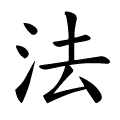法 fǎ law; standard
Made up of [氵 shuǐ water radical 85, 去 qù go ]The presence of 'water' and 'depart' element gives the concept of good law washing away dirt
Ancient small seal form 

Related characters
Also uses 氵 shuǐ component: 波 bō (wave) 港 gǎng (harbor) ; 海 hǎi (sea) ; 汗 hàn (perspiration) ; 汉 hàn (chinese) ; 河 hé (river) ; 洪 hóng (flood) ; 湖 hú (lake) ; 活 huó (to live) ; 济 jì (to cross a river) ; 江 jiāng (river) ; 津 jīn (ferry crossing) ; 酒 jiǔ (wine) ; 满 mǎn (to fill) ; 没 méi (have not) ; 泡 pào (bubble) ; 汽 qì (steam) ; 浅 qiǎn (shallow) ; 清 qīng (clear) ; 涉 shè (to wade) ; 洗 xǐ (to wash) ; 演 yǎn (to develop) ; 渔 yú (fishing) ; 泽 zé (pool) ; 治 zhì (to rule) ; 洲 zhōu (region)
Different tone
发 fà (to send out)Pronunciation
Sound file kindly provided by shtooka.net ➚ under a Creative Commons Attribution Share Alike License

Stroke order for character 法, kindly provided under Wikimedia creative commons license ➚
Proverbs
作法自毙 zuò fǎ zì bì To fall foul of rules of your own making.约法三章 yuē fǎ sān zhāng Imposing simple and clear laws. At the end of the bitter Civil War that brought the Qin dynasty to an end in 206BCE, the leader Liu Bang chose to dispose of all the laws of the Qin, replacing them with three simple laws: do not kill; do not harm and do not steal. Liu Bang went on to found the Han dynasty that ruled for 400 years.